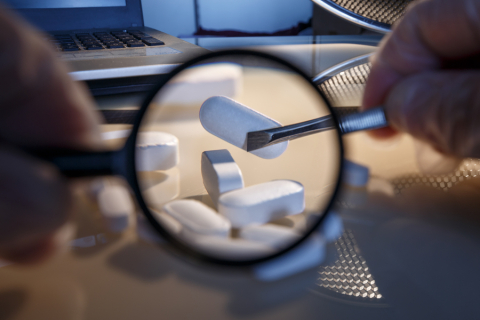The conference entitled "Substandard medicines, medical devices and dietary supplements - identifying and minimising risks to public health" was held online on 9 December as part of the Fourth World Week Against Falsified Medicines. Apart from Polish experts, foreign guests attended it: Dr Richard Wanko from the European Directorate for the Quality of Medicines from Strasbourg, and Luigi Garruto, an officer from OLAF - the European Anti-Fraud Office. Speakers, therefore, included not only academics, but also senior police officers who counter the illegal sale of pharmaceuticals.
Pangea action
One could find out about the scale of the problem by listening to a speech given by Prof. Zbigniew Fijałek from the Laboratory of Forensic Pharmacy at the Medical University of Warsaw and the "STOP Illegal Pharmaceuticals" Association. Among other things, the professor spoke about the international Pangea action. This cyclical operation is linked to the online trade-in of illegal drugs. It involves checking small consignments for a week for the presence of illegal medicines and medical devices. This year, 9 million illegal products worth approximately $23 million were found and confiscated during the operation. Psychotropic drugs were predominant. Significant quantities of potency-enhancing and anaesthetic drugs were also found. Many medical devices were also seized, namely COVID-19 tests, masks, surgical instruments and antiseptics. As a result of the Pangea action, 277 investigations were launched, and an incredible number of websites offering illegal pharmaceuticals were taken down. Prof. Fijałek pointed out that the Swiss Medicines Agency has published accurate information on their participation in the Pangea Action. It turned out that 41% of the parcels containing illegal pharmaceuticals checked by the Swiss came from Poland.
Theft of medicines
A significant problem is not only counterfeiting, but also the theft of medicines and medical devices. Prof. Zbigniew Fijałek and dr Richard Wanko spoke about this, citing reports from Europe of the theft of many millions of protective masks, which were then illegally introduced into the legal distribution network or offered on the internet. Europe is seeing a marked increase in the crime of theft of medicines and medical devices. Last year, such crimes account for as much as 6 per cent of all thefts, compared to around 2 per cent in previous years. Luigi Garutto of OLAF and Polish police officers from the Central Bureau of Police Investigation spoke about how counterfeiters and illegal traffickers can be combated systematically and organised.
Controversy over supplements
During the conference, it was also possible to listen to lectures on legal aspects related to the registration of medicines and the supervision of their quality. In the last session, Prof. Włodzimierz Opoka gave an exciting presentation from the Department of Inorganic and Analytical Chemistry, Medical Centre of the Jagiellonian University in Kraków. The professor began by referring to a study by scientists in Canada, who looked at various dietary supplements containing vitamins and bio-elements. They wanted to see if they reduced the risk of cardiovascular disease, heart attack, stroke or premature death. It found that people's dietary supplements most commonly taken have little or no effect on their health. The Supreme Chamber of Control has inspected nutritional supplements in Poland. They have shown that the qualitative and quantitative composition declared on the packaging does not match some preparations. Prof. Opoka decided to say "Check" to the manufacturers of dietary supplements and addressed specific factual questions. For example, what is the actual action at the molecular level of a preparation supposed to 'prevent water accumulation in the body'? How do the ingredients in a supplement supposed to 'counteract acidity' help maintain acid balance, and what is the definition of acidity? Does a high-dose vitamin C supplement packaging contain information about the possible effects of overdosing and how additional doses of vitamin C would support immunity? Professor Opoka should test supplements for quantitative and qualitative composition and microbiological purity in independent laboratories. A preparation tested in this way can effectively supplement the deficiency of specific components, with the proviso that a doctor must first diagnose this deficit.
The organisers of the conference were: Laboratory of the Forensic Pharmacy MUW, Stop Illegal Pharmaceuticals Association, Polish Society of Laboratory Diagnostics Warsaw Section,Office for Registration of Medicinal Products, Medical Devices and Biocidal Products, Police School in Piła.
